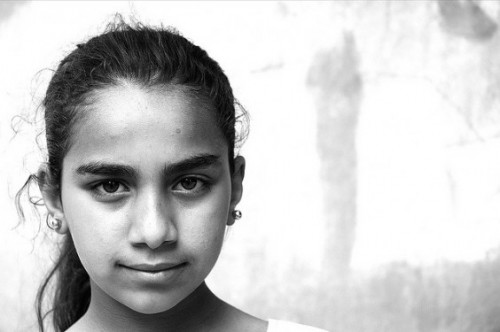Zahra
by Hamdy El-Gazzar / April 6, 2014 / No comments
“There she was, present like verdant life, like something painful…just a meter away from me.”

Photo by Aida El Baradei via Flickr
I have no name for her other than Zahra. And that’s not even correct.
I’ve given her a name from my imagination because I never got to learn her real name.
I remember: There she was, present like verdant life, like something painful, like hunger, just a meter away from me.

- “From Egypt” attempts to draw a cultural map of Egypt and the Arab world by profiling the artistic, literary, and political issues that affect the region via on-the-ground coverage of current events, publications, and the fight for freedom of expression.

- Hamdy El-Gazzar is an Egyptian writer and one of the 39 young Arab writers included in the Beirut 39 Project. His first novel, Sihr Aswad (Dar Merit, 2005) won the prestigious Sawaris Award, and was subsequently translated by Humphrey Davies (Black Magic, AUC Press, 2007). His second novel, Ladhdhat Sirriyya (Secret Pleasures) was published by Dar al-Dar in 2008. He is currently working on a third novel.
She was a total stranger in our district. She didn’t live with us during our childhood of side streets and alleyways in Tulun. She didn’t play with us or go to our school. We didn’t witness her grow, didn’t watch as she grew tall, nor fizz and spin as she bid good-bye to childhood and became a girl with a chest of lemons. We didn’t see her change into a buxom young woman with a chest of oranges. She didn’t see us as we crossed from the tender skin of childhood to the bristly, rough skin of teenagers. She didn’t see the green shoots of our mustaches taking root and growing heavier, nor our muscles growing, didn’t hear our voices coarsen and deepen.
I knew most of the girls in Tulun, those of my own age, older and younger ones, their sisters, fathers and mothers, but my eyes had never fallen on this stranger once, not in any neighborhood, street, or alleyway in Tulun.
She was a stranger who passed as quickly as a pleasant summer breeze.
When I first saw Zahra she was standing in the crammed and crowded bread queue outside Tulun’s municipal bakehouse, the only bakehouse in our district. Her small body was almost flattened in the disorganized queue, with every woman pushing the woman in front of her with both hands and nudging the woman behind with their elbows. She was tightly wedged between two large women wearing black wraps, the hawker Um Shafeeq and her unattractive daughter Shafeeā. Between these two corpulent bodies the thin Zahra almost disappeared. Shafeeā would push her from behind and Um Shafeeq would nudge her in the ribs with her elbow.
At one point Zahra’s delicate brown hand clung to Um Shafeeq’s robes to stop herself from falling under foot. Another time she had to lean on Shafeeā’s back to keep from falling on her face.
Zahra fought to avoid tumbling and being trodden while keeping her place in the bread queue. She had a refined figure, and was around fifteen years old, smiling despite the pain of being prodded and squashed. She had delicate red lips and two enchanting dimples. Her face was round like a small sun, with beautiful black eyes framed by long, soft jet black hair that flowed around her visage.
I was seized by her beauty. I wanted to see the rest of her body. I wanted to glide my eyes over her neck, chest, waist, thighs, and legs. I could not though, for no other reason than that her body was concealed in the crowd of large, overweight women who were in front, behind, and all around her. After some quarrels, disputes, and time had passed the crowd dispersed a little and the queue leveled out. The front soon neared the window behind which sat Hassan the baker and his bread.
Slowly, Zahra’s body grew visible, from head to toe. My mouth gaped. She was wearing a sack! One of those thick, rough sacks to hold flour, sugar, or maize. Her sack was washed, and clean of course, but it barely covered her knees. Her long, elegant, beautiful arms, like the wings of a rare bird, poked out through sleeveless arm holes.
My eyes met hers for a moment and in them I saw her say: “How lovely it would be if you could see me in a colored dress of silk.”
Zahra was beautiful. She knew that she was the most beautiful girl in the bread queue. The most beautiful girl to appear in Tulun, in the whole of Cairo. She also knew the harsh fact that she was wearing a flour sack and that no girl in this district had ever worn what she was wearing—not even the daughters of the beggars in the shack towns, the slums in Qale’t Al-Kabsh and Shaykhoun. She could feel that Um Shafeeq and Shafeeā despised her being between them.
The girl was very beautiful and aggrieved. Her true existence had been turned upside down, like a flower placed in the fountain of a municipal lavatory.
At the time I was sixteen, discontented, angry, and foolish. My heart had begun to be concerned with females and my mind was always busy thinking about them. I wanted to have a sweetheart to love.
I wanted to speak to Zahra, even if was just to say one thing, like “How are you?” or “You are beautiful…” or ”Don’t be sad.” or “What year are you in?” or “Where are you from?” But I was too shy and hesitated, nailed where I stood, staring at her like an idiot.
Finally, she arrived at the bread window. She didn’t raise her hand with money, but only raised her face to Hassan and smiled at him. He gave her bread.
She crossed the street near me, holding the bread that Hassan had compassionately given her between her bare hands and against her chest. She passed me on my left, taking slow steps, looking at me and smiling, as if she was questioning the secret of why I was so concerned with her. She had taken many steps away from me when she stopped, as if she had forgotten something. Then she bent her neck backwards, looked at me, and smiled, as if she was a princess carrying loaves of gold between her hands. I smiled at her, then became uneasy and shy. I turned my face to the ground.
For certain there was no trace of sympathy or pity in my eyes—no, it was something much more beautiful and wonderful than that. In my eyes was adolescent love and in my chest was a trembling heart.
I never saw her again after that, not even once. I tried to imagine her back story, but never found out.
I returned home, carrying loaves of bread against my chest. The heart inside of it was filled with something new, sweet, and beautiful. My mother was not home.




